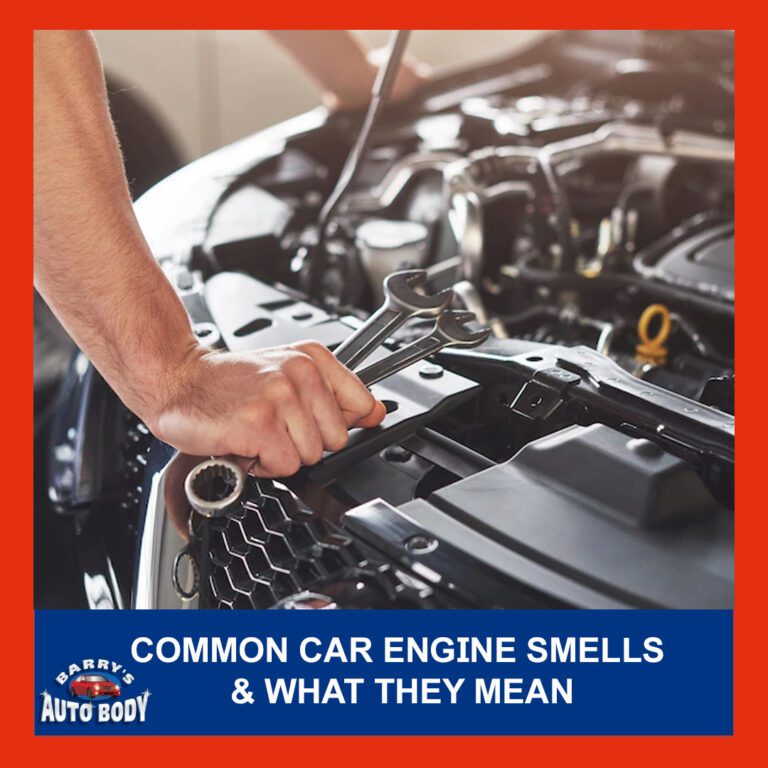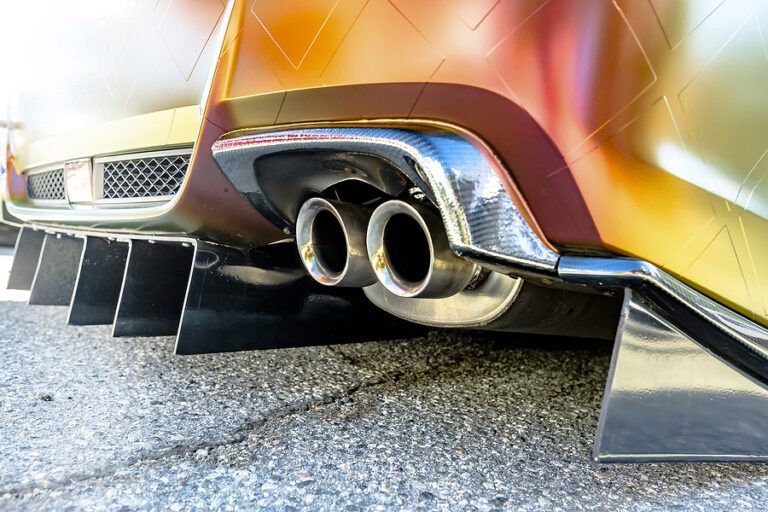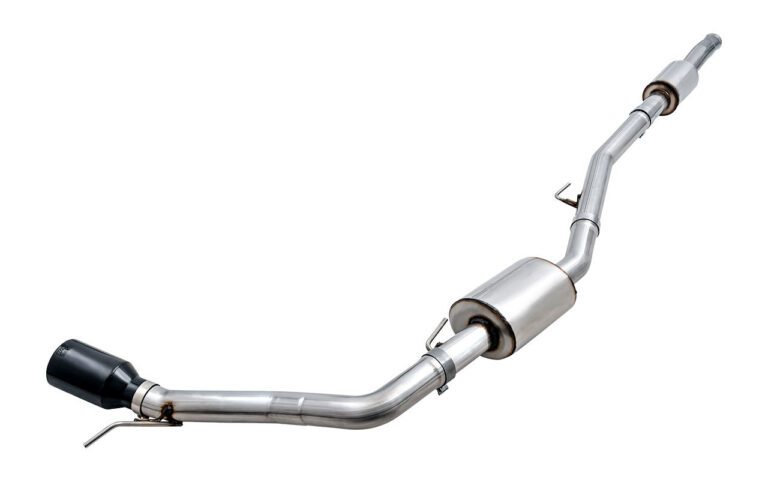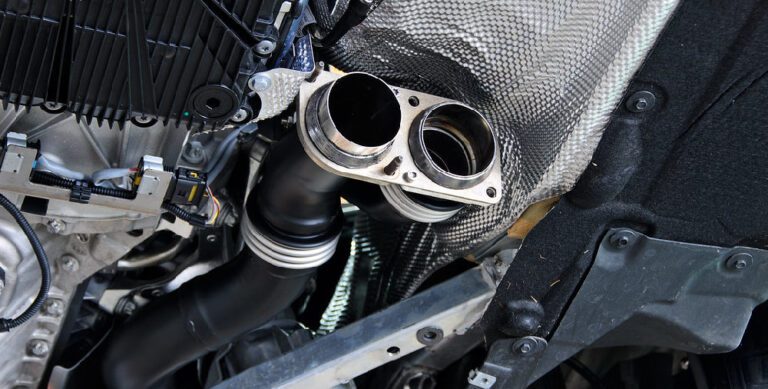Is the Muffler And Exhaust the Same Thing? Unveiling the Automotive Industry’s Secret
No, the muffler and exhaust are not the same thing. A muffler is a specific component of the exhaust system that is designed to reduce noise, while the exhaust refers to the entire system that carries the exhaust gases from the engine to the tailpipe.
Your vehicle’s exhaust system plays a crucial role in maintaining the performance and efficiency of the engine. It not only removes harmful gases but also reduces noise. The muffler, as mentioned earlier, is a key component of the exhaust system that is responsible for minimizing the noise produced by your vehicle.
However, it’s important to note that the exhaust system consists of more than just the muffler. It includes other components like the exhaust manifold, catalytic converter, and pipes that work together to carry out the exhaust gases. Understanding the difference between the muffler and the exhaust system can help you better comprehend the complexity of your vehicle’s exhaust system. We’ll dive deeper into the functions and roles of both the muffler and the exhaust system.
What Is The Purpose Of A Muffler?
The purpose of a muffler in a vehicle is to reduce engine noise. It is designed to dampen the high-frequency sound waves produced by the exhaust gases exiting the engine. By doing so, mufflers help in creating a more comfortable driving experience for both the vehicle occupants and the surrounding environment.
In addition to reducing noise, mufflers also play a role in improving the overall performance of the vehicle. They are designed to optimize the flow of exhaust gases, allowing for better engine efficiency. This can lead to improved fuel economy and increased power output.
When it comes to the components and design of a muffler, it typically consists of a series of chambers and baffles. These internal components work together to absorb and reflect sound waves, effectively reducing noise levels. The size, shape, and materials used in the construction of the muffler can influence its performance and sound reduction capabilities.
In conclusion, mufflers are not the same thing as the exhaust system, but they are an essential component of it. They serve the purpose of reducing engine noise and improving overall vehicle performance. Understanding the role and design of a muffler can help in choosing the right one for your vehicle.
The Role Of The Exhaust System
htmlThe muffler and exhaust system play vital roles in a vehicle’s overall performance. The exhaust system is responsible for guiding and directing the engine’s waste gases away from the engine and out of the vehicle. It consists of several components, including the exhaust manifold, catalytic converter, resonator, and muffler.
The exhaust manifold collects the gases directly from the engine’s cylinders and routes them into a single pipe. The catalytic converter then helps reduce harmful emissions by converting harmful gases into less harmful ones. The resonator helps reduce noise and the muffler further reduces exhaust noise.
In addition to minimizing noise, the exhaust system also plays a crucial role in improving fuel efficiency. A well-maintained exhaust system ensures proper engine performance and helps the engine function more efficiently, resulting in better fuel consumption.
Therefore, it’s important to understand that while the muffler is a part of the exhaust system, they are not the same thing. The muffler is just a component of the larger exhaust system, which performs various functions to ensure optimal vehicle performance.
Exploring The Muffler And Exhaust Relationship
Exploring the Muffler and Exhaust Relationship
The muffler and exhaust are two separate components in a vehicle’s exhaust system; however, they work together to perform critical functions. The muffler is responsible for reducing the noise produced by the engine during the combustion process. It achieves this through the use of chambers and baffles that absorb and cancel out sound waves. On the other hand, the exhaust system is responsible for directing the gases produced by the engine out of the vehicle.
These two components have a strong interdependency as the exhaust gases pass through the muffler, allowing it to further reduce noise levels. Furthermore, the muffler can also affect the performance of the exhaust system by influencing the flow of gases. It is important to note that while the muffler and exhaust work together, they serve different purposes and replacing one does not necessarily mean replacing the other.
Common misconceptions about the muffler and exhaust relationship need to be deciphered. It is often believed that a louder muffler contributes to better exhaust flow, but this is not true. The design and construction of the muffler are crucial in maintaining the proper functionality of the exhaust system.
The Similarities Between Mufflers And Exhausts
The muffler and exhaust are two essential components of a vehicle’s exhaust system, working together to expel engine waste gases. Although they are distinct parts, they share common goals and perform overlapping functions.
The primary function of both the muffler and exhaust is to reduce noise produced by the engine’s combustion process. They achieve this by dissipating and redirecting sound waves through chambers or baffles, resulting in a quieter driving experience.
Additionally, both the muffler and exhaust play a crucial role in improving engine performance and fuel efficiency. They help regulate the backpressure in the exhaust system, maintaining optimal airflow and enhancing overall engine function.
In terms of design, the muffler and exhaust often feature similar construction materials, such as stainless steel or aluminum, to withstand the high temperatures and corrosive gases in the exhaust system. They may also incorporate catalytic converters to reduce harmful emissions.
| Muffler | Exhaust |
|---|---|
| Dissipates and redirects sound waves | Expels engine waste gases |
| Reduces noise | Improves engine performance |
| Aids in fuel efficiency | Constructed from durable materials |
| May incorporate catalytic converters |
Decoding The Differences: Mufflers Vs. Exhausts
Mufflers and exhausts are often used interchangeably, but they are not the same thing. Understanding the differences between them is important when it comes to maintaining and upgrading your vehicle’s exhaust system.
The muffler is a subcomponent of the exhaust system and plays a significant role in reducing noise produced by the engine. Its primary function is to dampen the sound waves created during the combustion process. It achieves this by using chambers and baffles to redirect and dissipate the sound energy.
On the other hand, the exhaust system encompasses the entire path that engine gases take from the engine cylinders to the tailpipe. It includes the manifold, catalytic converter, pipes, and the muffler itself. Its main objective is to expel harmful gases from the engine and minimize their impact on the environment.
When it comes to design and construction, mufflers can vary considerably between vehicles and manufacturers. They may employ different materials, such as stainless steel or aluminized steel, and various internal configurations to achieve optimal sound reduction. Additionally, exhaust systems can have different layouts and sizes depending on the engine’s power and requirements.
The Evolution Of Mufflers And Exhaust Systems
The Evolution of Mufflers and Exhaust SystemsThe muffler and exhaust systems have undergone significant changes throughout history, driven by advancements in technology, materials, and industry standards in the automotive sector. These changes have transformed these components from simple devices for noise reduction to crucial parts of a vehicle’s performance and efficiency.
Historically, mufflers were primarily developed to reduce noise levels produced by the engine exhaust. However, over time, manufacturers began to realize the potential to optimize engine performance by improving exhaust flow.
Advancements in technology and materials allowed for the development of mufflers and exhaust systems that not only reduced noise but also improved engine efficiency. Innovative designs, such as tuned mufflers and exhaust systems, were introduced to enhance engine power and torque.
Moreover, the shifts in automotive industry standards towards environmental sustainability and fuel efficiency have influenced the evolution of mufflers and exhaust systems. The integration of catalytic converters and particulate filters became commonplace to reduce harmful emissions and comply with strict regulations.
Table representing key advancements in mufflers and exhaust systems| Advancements | Description |
|---|---|
| Improved Flow Design | Increase in exhaust gas flow efficiency to enhance engine performance. |
| Tuned Mufflers | Designs with tuned chambers to optimize sound reduction and engine power. |
| Catalytic Converters | Incorporation of catalytic converters to minimize harmful emissions. |
| Particulate Filters | Addition of filters to capture and reduce particulate matter in exhaust gases. |
This historical background and the continuous advancements in technology and industry standards have transformed mufflers and exhaust systems into vital components for both performance and environmental considerations in modern vehicles.
The Impact Of Muffler And Exhaust Modifications
Is the Muffler And Exhaust the Same ThingThe muffler and exhaust are two distinct components of a vehicle’s exhaust system. The muffler is responsible for reducing noise produced by the engine, while the exhaust system carries waste gases away from the engine. Modifying these components can have various effects on vehicle performance and power.
Effects on vehicle performance and power: Modifying the muffler and exhaust system can potentially increase performance and power by improving exhaust flow. This can result in better fuel efficiency and increased horsepower.
Legal considerations and restrictions: It is important to be aware of any legal restrictions regarding muffler and exhaust modifications. Some jurisdictions have strict noise regulations and may require specific certifications for aftermarket modifications.
Benefits and drawbacks of aftermarket modifications: Aftermarket modifications can offer benefits such as enhanced sound, increased performance, and a unique look. However, they may also void warranties, cause compatibility issues, and potentially result in increased noise levels that may not comply with local regulations.
Maintaining And Repairing Mufflers And Exhausts
htmlA properly functioning muffler and exhaust system is crucial for a vehicle’s performance and safety. Recognizing the warning signs of muffler or exhaust issues can save you from expensive repairs and potential hazards.
Regular inspections and routine maintenance can help extend the life of your muffler and exhaust system. Look out for any noticeable changes in engine noise, increased exhaust smoke, or strong odors. These could indicate a problem that needs attention.
| Common Repairs and Replacement Procedures |
|---|
| • Repairing or replacing damaged or rusted components |
| • Fixing exhaust leaks or loose connections |
| • Replacing worn-out or malfunctioning catalytic converters |
| • Installing new mufflers or exhaust systems |
By addressing muffler and exhaust issues promptly, you can avoid further damage to your vehicle’s engine and ensure a quieter and cleaner driving experience. Remember to consult a professional mechanic for expert advice and accurate diagnosis.
The Future Of Mufflers And Exhaust Systems
When discussing the topic of mufflers and exhaust systems, it’s important to understand that they are not the same thing. While the muffler is a component of the exhaust system, it serves a specific function in reducing noise. The exhaust system, on the other hand, is responsible for guiding the exhaust gases away from the engine and regulating emissions.
The future of mufflers and exhaust systems is witnessing a range of fascinating innovations in noise reduction technology. These advancements aim to enhance the overall driving experience by minimizing noise pollution. Additionally, environmental concerns and increasing emission regulations have propelled the development of more efficient exhaust systems that can reduce harmful emissions and contribute to a cleaner environment.
Furthermore, the prospects for alternative exhaust system designs are emerging, with researchers exploring novel approaches to maximize efficiency and performance. These designs may include improved airflow dynamics, advanced materials, and innovative shapes, all with the goal of optimizing engine power and fuel efficiency.

Credit: www.advrider.com
Frequently Asked Questions For Is The Muffler And Exhaust The Same Thing
Is The Muffler And Exhaust The Same Thing?
No, the muffler and exhaust are not the same thing. The exhaust system is responsible for carrying exhaust gases away from the engine, while the muffler is a component within the exhaust system that reduces noise produced by the engine.
Both are essential for the proper functioning of a vehicle’s engine.
What Is The Purpose Of A Muffler In A Car?
The purpose of a muffler in a car is to reduce the noise produced by the engine’s exhaust gases. It does this by using a series of chambers and sound-absorbing materials to dampen and dissipate the sound waves created by the engine.
In addition to reducing noise, the muffler also helps to improve engine performance and fuel efficiency.
Can A Car Run Without A Muffler?
Yes, a car can run without a muffler, but it is not recommended. Without a muffler, the engine’s exhaust gases would be expelled directly into the atmosphere without any noise reduction. This can result in excessively loud and obnoxious noise levels, as well as potential legal issues in certain jurisdictions.
Additionally, a properly functioning muffler helps to improve engine performance and fuel efficiency.
Conclusion
To sum up, although the terms “muffler” and “exhaust” are often used interchangeably, they actually refer to different components of a vehicle’s exhaust system. The muffler focuses on reducing noise, while the exhaust system encompasses the entire pathway for exhaust gases.
Understanding this distinction is important for car owners who want to properly maintain and optimize their vehicles’ performance. By grasping the functionalities of both the muffler and exhaust, you can make informed decisions when it comes to repairs and upgrades.








